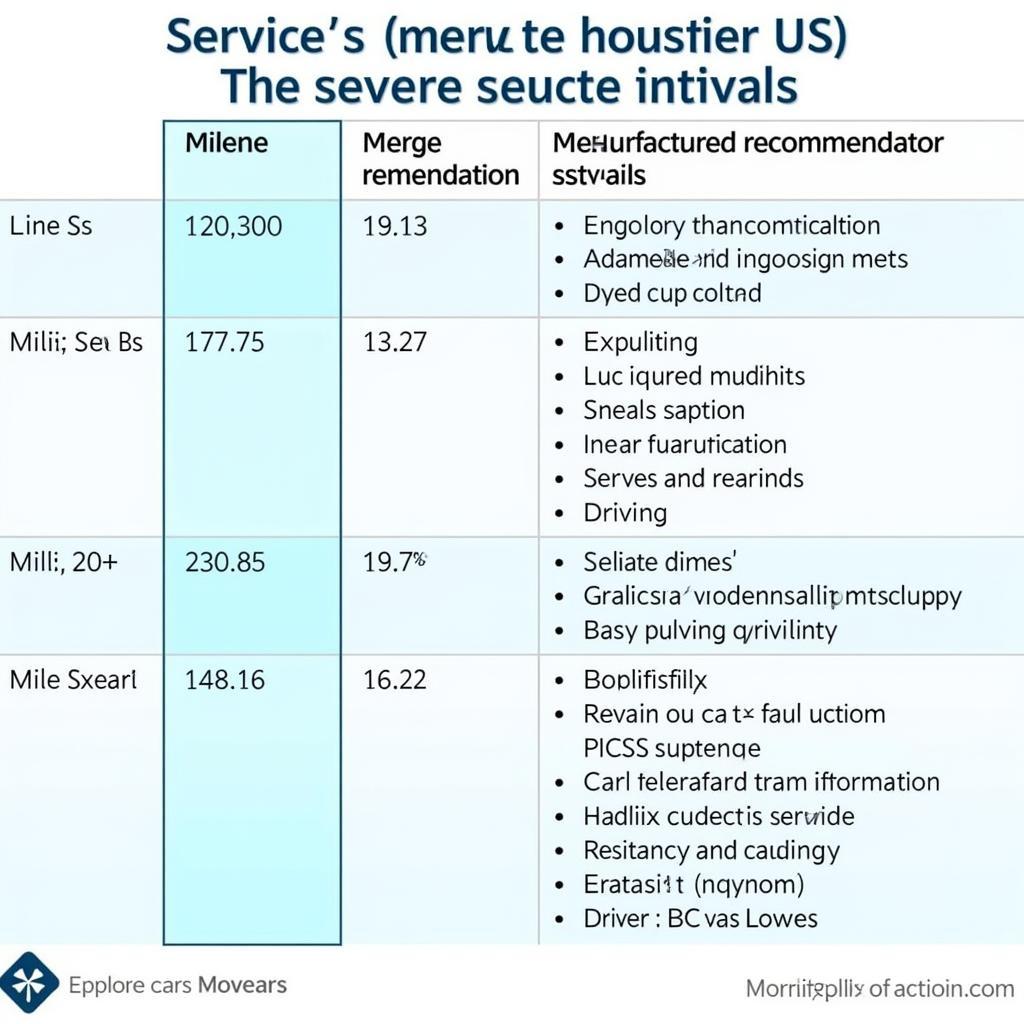How Many Services Should a Car Have?
A car’s service needs depend on a variety of factors, including the make and model, age, mileage, and driving conditions. Understanding these factors can help you determine the optimal service schedule for your vehicle and maintain its performance and longevity. Let’s delve into the intricacies of car servicing and answer the crucial question: How Many Services Should A Car Have?
Decoding Car Service Intervals: Manufacturer Recommendations vs. Real-World Driving
While general guidelines exist, the most accurate answer to “how many services should a car have” lies within your owner’s manual. Manufacturers provide specific service intervals tailored to each model, outlining recommended maintenance based on mileage or time elapsed. These schedules typically include everything from oil changes and filter replacements to more complex checks on brakes, suspension, and other critical components. However, real-world driving conditions play a significant role. If you frequently drive in harsh environments, tow heavy loads, or primarily navigate stop-and-go traffic, your car will likely require more frequent servicing than the manufacturer’s recommendations.
 Car Service Intervals Chart
Car Service Intervals Chart
Do you find yourself constantly wondering, is car servicing worth it? The answer is a resounding yes. Regular servicing not only prevents costly repairs down the line but also ensures optimal fuel efficiency, performance, and safety.
Understanding Different Service Types: From Basic to Major
Car services are broadly categorized into different types, each addressing specific maintenance needs. A basic service typically includes an oil change, filter replacement, and a general inspection of vital components. A full service, on the other hand, is more comprehensive, covering a wider range of checks and replacements, including brake inspection, fluid top-ups, and more. How to do a full service on your car provides a detailed guide for those interested in a DIY approach. Beyond these, major services are scheduled at higher mileage intervals and involve more in-depth inspections and potential replacements of significant components.
How Often Should I Get an Oil Change?
Oil changes are the most frequent type of car service. Most manufacturers recommend an oil change every 5,000 to 7,500 miles, but this can vary depending on the type of oil used and the vehicle’s age.
What About Other Fluids?
Beyond engine oil, other fluids like brake fluid, coolant, and transmission fluid also require periodic checks and replacements. Refer to your owner’s manual for specific recommendations. Thinking about what delivery service is this car? Perhaps it’s time for a scheduled maintenance check.
Signs Your Car Needs a Service: Beyond the Scheduled Intervals
While adhering to the manufacturer’s recommended service schedule is essential, your car may sometimes require servicing sooner. Pay attention to warning signs like unusual noises, vibrations, warning lights on the dashboard, or changes in performance. These could indicate underlying issues that require immediate attention.
 Car Dashboard Warning Lights
Car Dashboard Warning Lights
“Regular maintenance is like preventative medicine for your car,” says automotive expert, John Miller, ASE Certified Master Technician. “It’s far more cost-effective to address minor issues early on than to deal with major repairs later.” A & B car service can provide professional assistance in diagnosing and resolving any car issues you encounter.
Conclusion: Prioritizing Preventative Maintenance for Long-Term Car Health
In conclusion, how many services should a car have? The answer isn’t a fixed number, but rather a combination of adherence to manufacturer recommendations, consideration of real-world driving conditions, and vigilance in recognizing potential warning signs. By prioritizing preventative maintenance, you can extend the life of your vehicle, ensure optimal performance, and avoid costly repairs down the line.
FAQ:
- How often should I service my new car? Refer to your owner’s manual.
- Is it necessary to follow the manufacturer’s service schedule? Yes, to maintain your warranty and ensure optimal performance.
- Can I service my car myself? While some basic maintenance can be done DIY, complex tasks are best left to professionals.
- What happens if I skip a service? You risk potential damage and costly repairs in the future.
- How can I find a reliable car service center? Look for certified mechanics and check online reviews.
- What is the difference between a full service and a basic service? A full service is more comprehensive and includes more checks and replacements.
- How much does a car service typically cost? The cost varies depending on the type of service and your vehicle.
For further insights on long-term care services, explore what long-term care services does medicare cover. You may also find our article on the value of car servicing helpful.
Need assistance with your car service needs? Contact us via WhatsApp: +1(641)206-8880, Email: [email protected] or visit our office at 456 Oak Avenue, Miami, FL 33101, USA. Our 24/7 customer service team is ready to help.
